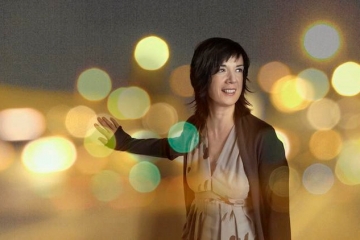Luxemburgensia / „The Pleasure of Drowning“ by Jean Bürlesk is a promising debut

Jean Bürlesk: Self-Portrait in front of a fake tree
In his first collection of short stories, Jean Bürlesk revisits fairy tales, local myths and fantasy tales, giving them a contemporary twist while adding a pinch of humour and irony. Despite the inconsistent quality of the stories, this is a promising, if somewhat flawed debut.
A long, long time ago, writers started debunking fairy tales. Ever since Vladimir Propp’s „Morphology of the Folktale“, in which the Russian formalist describes the (repetitive) common patterns and functions of these short narratives, writers have rewritten these formative stories over and over, giving them a contemporary edge, weaving the originally rigid storylines or binary characters into more complex, ambiguous plots while adding unexpected outcomes to foreseeable happy endings. For instance, it has become rather unlikely in contemporary rewritings of fairy tales that the prince gets to marry the princess simply by virtue of having saved her. It has become equally improbable that they’ll go on to live happily ever after – probably because a writer keen on using precise words knows that „ever after“ simply doesn’t mean anything.
In his first collection of stories, which was awarded the „Prix d’encouragement de la Fondation Servais 2019“, Bürlesk combines the local and the universal, revisiting ubiquitous fairy tales such as Rapunzel (in „Hair“) or „Cinderella“ („Cinderella in the Shoe“), while adding the odd sci-fi-tale („Postcontemporary Beauty“), a series of short poems based on the character of the wife-murdering „Bluebeard“, a cruel take on the „Beauty and the Beast“ as well as perhaps most notably, a rewriting of the tale of Melusina.
Rebalancing power relations
Since fairy tales are formative in the sense that they are the narratives with which most of us grow up with and through which we gain an understanding of how stories work, these out-dated tales reveal archaic patterns such as chauvinism, misogyny or even the praise of rape culture, especially taken through the prism of their contemporary rewritings. These patterns are being put to the front and deconstructed within Bürlesk’s stories, which aim at rebalancing the inherent power relations of the hypotexts in favour of the dominated, repressed, or female.
„Hair“ depicts a (probably male) Rapunzel who can’t lead a normal life because of the length of his hair, „The Princess and the F***“ reverses the famous frog-human-metamorphosis, „Cinderella in the Shoe“ reveals the famous shoe to be nothing but a prop while „Foundations“ shows Melusina listening to a tourist guide (Bürlesk himself) telling her story to a bunch of tourists while commenting on his narrative, all the while waiting to be freed from her prison. While Bürlesk’s attempt may seem brave – Melusina tries to reappropriate her own story and end the patriarchal, submissive dimension of it –, his particular twist leaves her dependent on a male gaze and attention, thus somehow diluting his subversive, feminist take on the story.
Compared to the fairy tale rewriting common in Eric Chevillard’s novels, Bürlesk’s tales reproduce a similar love for playfulness, zany reversals or witty, unexpected character development, but lack Chevillard’s metaphysical twists, his fiercely critical deconstructive agenda and fundamental disbelief in well-structured narrative. Bürlesk’s tales reproduce similar patterns throughout the collection while clinging to classical storytelling.
Under the Influence
Some of them work better than others – while „The Beauty of the Beast“, in which we follow the elegant, elaborate stratagem of a werewolf trying to seduce a young lady whose father he has killed, and „Foundations“ work best, „Stories, Or Nothing Ever Happens in a Bar“ is too self-indulgent: even though it playfully confuses the reader by alternating between layers of reality, myth, and fiction – the universe of the story involves Sir Lancelot, King Arthur, drinking men in a bar and lightsabres –, the narrative process of denarration (you tell something as if it happened in the story and then withdraw it, retrospectively qualifying it a fictional delusion) seems both tired and erratic.
„Postcontemporary Beauty“ is the one story that doesn’t lean on a hypotext. It is a satirical take on „gender-based violence and heteronormativity“, as Bürlesk himself explains in his afterword. The story begins with the revenge plot of a beauty queen forced into retirement for being too old (she’s turned 19). Bürlesk creates an absurd world where a woman is considered „rather plump“ when weighing „all of thirty-seven kilograms“. The hyperbolic tone fits a story which is at its best both hilarious and fierce. It is therefore regrettable that in other stories (such as „The Beauty of the Beast“), women remain somehow gullible creatures much as they were in the fairy tales of centuries past. Here, a more radical and feminist stance would have benefited Bürlesk’s rewritings.
Stylistically, the play on the kind of grandiloquence common to many fairy tales or myths works perfectly: the witty British humour combined with the pastiche of the epic makes for a pleasant read. Even if there are moments of cliché – the mere idea, hidden away in the title, of „drowning“ in the words of the book – and some of the jokes wear thin – the zany character names, in „Postcontemporary Beauty“, are repeated over and over again –, there are lots of enjoyable and quote worthy moments and the syntax carries a deliberately dusty elegance which shows a mastery of different linguistic registers and styles.
Bürlesk is eager to weave his persona into his writing – it is one of many postmodern writing techniques that have now become so common that they even pervade codified genres like fantasy or science-fiction. In a foreword placed at the very end of the book (the afterword, which the author admits is really just another foreword, comes after his signature short story „Hair“), he gives an insight into his writing process, adding information about himself, his country of origin and the different stories. It might seem a tad megalomaniac to add twelve pages of explanation to a story collection of 70 pages, with most of the explanations being redundant: the stories are explicit enough and don’t need the writer’s own interpretation.
Despite its flaws, „The Pleasure of Drowning“ is a promising debut from a young writer who might still be a bit too much under the influence of the hypotext.

Info
„The Pleasure of Drowning“, Luna Press Publishing, Edinburgh, 2020, 88 pages
- Barbie, Joe und Wladimir: Wie eine Friedensbotschaft ordentlich nach hinten losging - 14. August 2023.
- Des débuts bruitistes et dansants: la première semaine des „Congés annulés“ - 9. August 2023.
- Stimmen im Klangteppich: Catherine Elsen über ihr Projekt „The Assembly“ und dessen Folgeprojekt „The Memory of Voice“ - 8. August 2023.



 Headlines
Headlines









 Umfrage
Umfrage
 Facebook
Facebook  Twitter
Twitter  Instagram
Instagram  LinkedIn
LinkedIn
Sie müssen angemeldet sein um kommentieren zu können.
Melden sie sich an
Registrieren Sie sich kostenlos